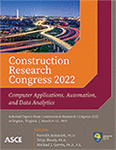Blockchain-Based Methodology for Collaborative Risk Assessment
Publication: Construction Research Congress 2022
ABSTRACT
Risk assessment is an important part of risk management in construction projects as it involves the identification, evaluation, and prioritization of potential risk events. This enables project teams to properly mitigate them. With the intent of getting risk input from multiple stakeholders, different systems have been developed to support collaborative risk assessment. However, these systems often face challenges such as no data confidentiality, poor data security, lack of transparency, and absence of traceability and auditability for the team members. Blockchain is an emergent decentralized digital technology that can provide solutions to overcome such deficiencies of centralized systems. In this study, the need for a novel blockchain-based methodology for collaborative risk assessment is analyzed. Multiple traits of blockchain technology have been found through the literature review. From these multiple traits, the key functional elements for the methodology have been identified and discussed in further detail. The research points out some of the limitations at the current state so that future work can be conducted to build a methodology that can be even more beneficial for the risk management of construction projects.
Get full access to this article
View all available purchase options and get full access to this chapter.
REFERENCES
Buterin, V. (2014). “Ethereum white paper: A next-generation smart contract and decentralized application platform.” Ethereum, 1–36.
Chong, H. Y., and Diamantopoulos, A. (2020). “Integrating advanced technologies to uphold security of payment: Data flow diagram.” Automation in Construction, Elsevier, 114, 103158.
CII (Construction Industry Institute). (2012a). “Applying Probabilistic Risk Management in Design and Construction Projects.”.
CII (Construction Industry Institute). (2012b). “Probabilistic risk management in design and construction projects.”.
CII (Construction Industry Institute). (2013). “Integrated Project Risk Assessment.”.
Dakhli, Z., Lafhaj, Z., and Mossman, A. (2019). “The potential of blockchain in building construction.” Buildings, 9(4).
Hamledari, H., and Fischer, M. (2020). “Construction Payment Automation Using Blockchain-Enabled Smart Contracts and Reality Capture Technologies.”.
Hamledari, H., and Fischer, M. (2021). “Role of Blockchain-Enabled Smart Contracts in Automating Construction Progress Payments.” Journal of Legal Affairs and Dispute Resolution in Engineering and Construction, 13(1), 04520038.
Han, S. H., Kim, D. Y., Kim, H., and Jang, W. S. (2008). “A web-based integrated system for international project risk management.” Automation in Construction, 17(3), 342–356.
Hsueh, S. L., Perng, Y. H., Yan, M. R., and Lee, J. R. (2007). “On-line multi-criterion risk assessment model for construction joint ventures in China.” Automation in Construction, 16(5), 607–619.
Monzer, N., Fayek, A. R., Lourenzutti, R., and Siraj, N. B. (2019). “Aggregation-Based Framework for Construction Risk Assessment with Heterogeneous Groups of Experts.” Journal of Construction Engineering and Management, 145(3), 04019003.
Nair, G. R., and Sebastian, S. (2017). “Blockchain Technology Centralised Ledger to Distributed Ledger.” International Research Journal of Engineering and Technology, 4(3), 2395–56.
Nakamoto, S. (2019). “Bitcoin: A Peer-to-Peer Electronic Cash System.”.
Nawari, N. O., and Ravindran, S. (2019). “Blockchain technology and BIM process: Review and potential applications.” Journal of Information Technology in Construction, 24, 209–238.
Patterson, F. D., and Neailey, K. (2002). “A risk register database system to aid the management of project risk.” International Journal of Project Management, 20(5), 365–374.
Pradeep, A. S. E., Yiu, T. W., Zou, Y., and Amor, R. (2021). “Blockchain-aided information exchange records for design liability control and improved security.” Automation in Construction, Elsevier B.V., 126, 103667.
“Private data — hyperledger-fabricdocs master documentation.” (2020). <https://hyperledger-fabric.readthedocs.io/en/release-2.2/private-data/private-data.html>(May 20, 2021).
PMI (Project Management Institute). (2008). Guide to the project management body of knowledge (PMBOK® Guide).
Shang, H., Anumba, C. J., Bouchlaghem, D. M., Miles, J. C., Cen, M., and Taylor, M. (2005). “An intelligent risk assessment system for distributed construction teams.” Engineering, Construction and Architectural Management, 12(4), 391–409.
Taroun, A. (2014). “Towards a better modelling and assessment of construction risk: Insights from a literature review.” International Journal of Project Management, Elsevier Ltd and APM IPMA, 32(1), 101–115.
Wang, J., Wu, P., Wang, X., and Shou, W. (2017). “The outlook of blockchain technology for construction engineering management.” Frontiers of Engineering Management, 4(1), 67.
Wang, Y., Chen, C. H., and Zghari-Sales, A. (2021). “Designing a blockchain enabled supply chain.” International Journal of Production Research, Taylor & Francis, 59(5), 1450–1475.
Wang, Z., Wang, T., Hu, H., Gong, J., Ren, X., and Xiao, Q. (2020). “Blockchain-based framework for improving supply chain traceability and information sharing in precast construction.” Automation in Construction, Elsevier, 111, 103063.
Wust, K., and Gervais, A. (2018). “Do you need a blockchain?” Proceedings - 2018 Crypto Valley Conference on Blockchain Technology, CVCBT 2018, 45–54.
Yaga, D., Mell, P., Roby, N., and Scarfone, K. (2019). “Blockchain Technology Overview.” National Institute of Standards and Technology, 8202.
Yang, R., Wakefield, R., Lyu, S., Jayasuriya, S., Han, F., Yi, X., Yang, X., Amarasinghe, G., and Chen, S. (2020). “Public and private blockchain in construction business process and information integration.” Automation in Construction, 118, 103276.
Information & Authors
Information
Published In
History
Published online: Mar 7, 2022
Authors
Metrics & Citations
Metrics
Citations
Download citation
If you have the appropriate software installed, you can download article citation data to the citation manager of your choice. Simply select your manager software from the list below and click Download.
